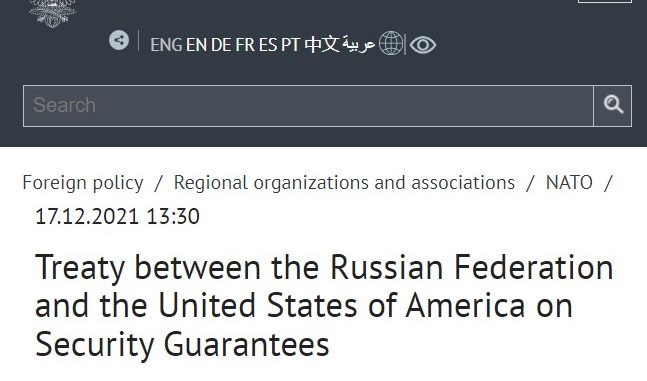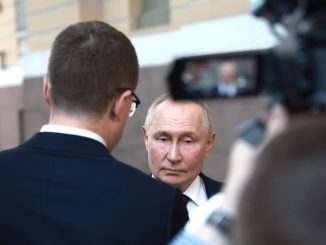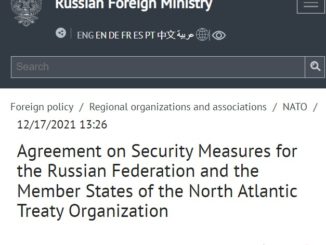
The Russian Federation and the United States of America, hereinafter referred to as the Parties,
Guided by the principles contained in the Charter of the United Nations, the Declaration on Principles of International Law Concerning Friendly Relations and Cooperation among States in accordance with the Charter of the United Nations1970, the Helsinki Final Act of the 1975 Conference on Security and Cooperation in Europe, as well as the provisions of the Manila Declaration on the Peaceful Settlement of International Disputes of 1982, the Charter for European Security of 1999, the Founding Act on Mutual Relations, Cooperation and Security between Russia and the North Atlantic Treaty Organization of 1997 ;
Recalling the inadmissibility in their mutual relations, as in international relations in general, of the use of force or the threat of force in any other manner inconsistent with the purposes and principles of the Charter of the United Nations;
Supporting the role of the United Nations Security Council, which has primary responsibility for the maintenance of international peace and security;
Recognizing the need to join efforts to effectively respond to contemporary security challenges and threats in a globalized and interdependent world;
on the basis of strict observance of the principle of non-interference in internal affairs, including the refusal to support organizations, groups and individuals advocating an unconstitutional change of power, as well as any actions aimed at changing the political or social system of one of the contracting Parties;
meaning to improve the existing ones or create additional effective and promptly launched mechanisms of interaction to resolve emerging problematic issues and disagreements through a constructive dialogue based on mutual respect and recognition of each other’s security interests and concerns, as well as to develop an adequate response to challenges and threats in the field of security ;
seeking to avoid any military confrontation and armed conflict between the Parties and realizing that a direct military clash between them could lead to the use of nuclear weapons, which would have far-reaching consequences;
Affirming that a nuclear war cannot be won and must never be started, as well as recognizing the need to make every effort to prevent the danger of such a war breaking out between nuclear-weapon States;
reaffirming their obligations under the Agreement on Measures to Reduce the Risk of a Nuclear War Between the Union of Soviet Socialist Republics and the United States of America of September 30, 1971, the Agreement between the Government of the Union of Soviet Socialist Republics and the Government of the United States of America on the Prevention of Incidents on the High Seas and in Airspace above it of May 25, 1972, the Agreement between the Union of Soviet Socialist Republics and the United States of America on the establishment of Centers for the Reduction of Nuclear Risk of September 15, 1987, as well as the Agreement between the Union of Soviet Socialist Republics and the United States of America on the Prevention of Dangerous Military Activities of 12 June1989;
agreed on the following:
Article 1
The Parties shall interact on the basis of the principles of indivisible and equal security, non-damage to each other’s security, and for these purposes:
do not take actions and do not carry out activities affecting the security of the other Party, do not participate in them and do not support them;
do not implement security measures taken by each Party individually or within the framework of an international organization, military alliance or coalition that would undermine the fundamental security interests of the other Party.
Article 2
The Parties shall ensure that any international organizations, military alliances or coalitions in which at least one of the Parties participates, observe the principles contained in the Charter of the United Nations.
Article 3
The Parties shall not use the territory of other states for the purpose of preparing or carrying out an armed attack against the other Party, or for other actions affecting the fundamental security interests of the other Party.
Article 4
The United States of America assumes obligations to rule out further eastward expansion of the North Atlantic Treaty Organization and to refuse admission to the alliance of states that were formerly members of the Union of Soviet Socialist Republics.
The United States of America will not establish military bases on the territory of states that were formerly members of the Union of Soviet Socialist Republics and are not members of the North Atlantic Treaty Organization, use their infrastructure for conducting any military activity, and also develop bilateral military cooperation with them.
Article 5
The Parties refrain from deploying their armed forces and weapons, including within the framework of international organizations, military alliances or coalitions, in areas where such deployment would be perceived by the other Party as a threat to its national security, with the exception of such deployment within the national territories of the Parties.
The Parties shall refrain from flights of heavy bombers equipped for nuclear or non-nuclear weapons and from the presence of surface combatants of all classes, including those within alliances, coalitions and organizations, in areas, respectively, outside national airspace and outside national territorial waters, from where they can hit targets in the territory of the other Party.
The parties maintain a dialogue and interact to improve the mechanisms for preventing dangerous military activities on the high seas and in the airspace above it, including agreeing on the maximum approach distance for warships and aircraft.
Article 6
The Parties undertake not to deploy ground-based intermediate and short-range missiles outside their national territory, as well as in those areas of their national territory from which such weapons are capable of hitting targets on the national territory of the other Party.
Article 7
The Parties shall exclude the deployment of nuclear weapons outside their national territory and shall return such weapons already deployed outside their national territory at the time this Treaty enters into force to their national territory. The Parties shall eliminate all existing infrastructure for the deployment of nuclear weapons outside their national territory.
The Parties shall not train military personnel and civilians from countries that do not possess nuclear weapons in the use of such weapons. The Parties do not conduct exercises and training of general forces, including the development of scenarios with the use of nuclear weapons.
Article 8
This Agreement shall enter into force from the date of receipt of the last written notification of the completion by the Parties of the necessary domestic procedures for this.
Done in duplicate, each in Russian and English, both texts being equally authentic.
For the Russian Federation
For the United States of America



Be the first to comment